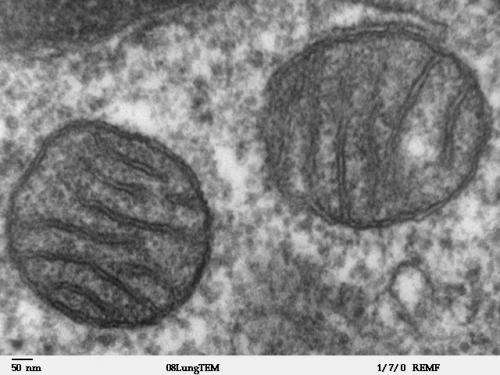August 6, 2015 report
Researchers find mistargeted mitochondrial proteins set off a proteostatic response in cytosol

(Phys.org)—A team of researchers with members from several research centers in Poland and Germany has found that certain mitochondrial proteins can set off a proteostatic response in cell cytosol. In their paper published in the journal Nature, the team describes their research results and suggests that if a means can be found to assist such responses, many diseases may be prevented. Cole Haynes with Memorial Sloan Kettering Cancer Center offers a News & Views piece on the work done by the team in the same journal edition.
Mitochondria are organelles that are found in living cells, and are responsible for, among other things, processing respiration and energy production. They are able to do their work only if certain proteins are present in the right proportions. Those proteins make their way to the mitochondria via liquid in the cell called cytosol. Sometimes though, something happens to prevent the right amounts of proteins from getting into the mitochondria, causing problems in the mitochondria itself, and also in the cytosol, as proteins build up. In this new effort, the researchers sought to learn what happens in the cell as those proteins build up.
To learn more, the team studied RNA transcripts and the associated proteins that are impacted when mitochondrial importation is disrupted. They found that production of both genes and proteins that are normally required for synthesis was less than normal. They also found that proteasome (the complex responsible for degrading proteins in the cytosol when they are no longer needed) activity increased along with assembly factors and chaperone proteins. This meant that the cells were actually adapting to the abnormal changes that had taken place in order to avoid cell death, which, in turn, would likely mean the death of the person afflicted.
Haynes cites another study that also found the body adapting to excess protein buildup in cytosol—where 40 genes were identified that stopped cell death when over-expression of protein cells that held damaged mitochondria were present.
Taken together, the studies indicate that the human body has built up responses to disruption of mitochondrial importation. And as Haynes also notes, going forward, researchers will likely be looking for other responses and perhaps most importantly, trying to determine the breaking point, when toxicity in the cell overwhelms the defensive mechanism, leading to cell death.
More information: Mistargeted mitochondrial proteins activate a proteostatic response in the cytosol, Nature (2015) DOI: 10.1038/nature14951
Abstract
Most of the mitochondrial proteome originates from nuclear genes and is transported into the mitochondria after synthesis in the cytosol. Complex machineries which maintain the specificity of protein import and sorting include the TIM23 translocase responsible for the transfer of precursor proteins into the matrix, and the mitochondrial intermembrane space import and assembly (MIA) machinery required for the biogenesis of intermembrane space proteins. Dysfunction of mitochondrial protein sorting pathways results in diminishing specific substrate proteins, followed by systemic pathology of the organelle and organismal death. The cellular responses caused by accumulation of mitochondrial precursor proteins in the cytosol are mainly unknown. Here we present a comprehensive picture of the changes in the cellular transcriptome and proteome in response to a mitochondrial import defect and precursor over-accumulation stress. Pathways were identified that protect the cell against mitochondrial biogenesis defects by inhibiting protein synthesis and by activation of the proteasome, a major machine for cellular protein clearance. Proteasomal activity is modulated in proportion to the quantity of mislocalized mitochondrial precursor proteins in the cytosol. We propose that this type of unfolded protein response activated by mistargeting of proteins (UPRam) is beneficial for the cells. UPRam provides a means for buffering the consequences of physiological slowdown in mitochondrial protein import and for counteracting pathologies that are caused or contributed by mitochondrial dysfunction.
Journal information: Nature
© 2015 Phys.org


















